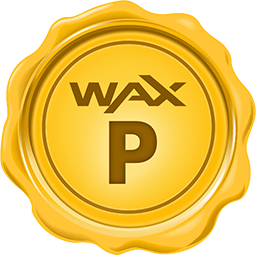-
 Bitcoin
Bitcoin $85,241.9855
0.76% -
 Ethereum
Ethereum $1,597.0257
0.52% -
 Tether USDt
Tether USDt $0.9994
-0.05% -
 XRP
XRP $2.0813
0.09% -
 BNB
BNB $590.8186
-0.10% -
 Solana
Solana $138.8687
3.49% -
 USDC
USDC $0.9997
-0.01% -
 Dogecoin
Dogecoin $0.1581
1.70% -
 TRON
TRON $0.2425
-0.85% -
 Cardano
Cardano $0.6270
1.80% -
 UNUS SED LEO
UNUS SED LEO $9.3414
2.15% -
 Chainlink
Chainlink $12.7688
1.17% -
 Avalanche
Avalanche $19.5247
2.22% -
 Stellar
Stellar $0.2463
0.89% -
 Toncoin
Toncoin $2.9696
-0.86% -
 Shiba Inu
Shiba Inu $0.0...01220
1.48% -
 Hedera
Hedera $0.1659
0.03% -
 Sui
Sui $2.1398
0.53% -
 Bitcoin Cash
Bitcoin Cash $337.5386
1.43% -
 Hyperliquid
Hyperliquid $17.9149
7.71% -
 Polkadot
Polkadot $3.7371
0.29% -
 Litecoin
Litecoin $76.0076
0.32% -
 Dai
Dai $0.9998
-0.01% -
 Bitget Token
Bitget Token $4.4680
2.24% -
 Ethena USDe
Ethena USDe $0.9991
0.00% -
 Pi
Pi $0.6477
3.98% -
 Monero
Monero $214.7885
-2.24% -
 Uniswap
Uniswap $5.2466
0.85% -
 OKB
OKB $50.8708
1.47% -
 Pepe
Pepe $0.0...07202
0.85%
How can blockchain technology be applied to supply chain transparency?
Blockchain enhances supply chain transparency via immutable ledgers, improving traceability, data security, and streamlining processes with smart contracts, fostering trust and real-time visibility for all participants.
Mar 05, 2025 at 08:36 pm
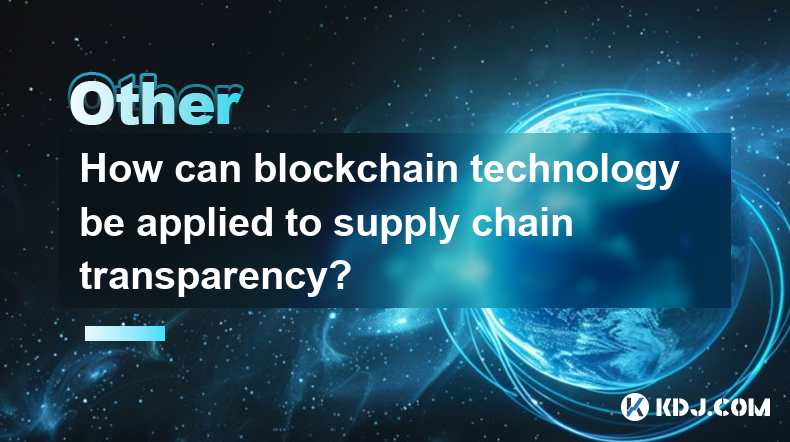
How Can Blockchain Technology Be Applied to Supply Chain Transparency?
Key Points:
- Enhanced Traceability: Blockchain's immutable ledger allows for complete tracking of goods from origin to consumer, eliminating counterfeits and improving accountability.
- Improved Data Security: Decentralized nature of blockchain enhances data security, reducing the risk of data breaches and manipulation.
- Streamlined Processes: Automation of processes through smart contracts reduces manual intervention, improving efficiency and reducing costs.
- Increased Trust and Collaboration: Shared, transparent data fosters trust among all supply chain participants, leading to stronger collaborations.
- Real-time Visibility: Participants gain real-time insights into inventory levels, shipment status, and other crucial data points, optimizing logistics and reducing delays.
Applying Blockchain to Supply Chain Transparency: A Detailed Exploration
The application of blockchain technology to enhance supply chain transparency offers a transformative potential. Let's delve into the specific ways this technology can revolutionize how goods are tracked and managed.
1. Enhanced Traceability and Product Provenance:
Blockchain's inherent immutability is its greatest strength in supply chain management. Each transaction involving a product—from raw material sourcing to manufacturing, distribution, and retail—is recorded as a block on the chain. This creates a permanent, tamper-proof record of the product's journey. This level of traceability is particularly valuable in combating counterfeiting, a significant issue across numerous industries. For instance, consider the luxury goods industry, where counterfeit products erode brand value and consumer trust. With blockchain, consumers can scan a product's unique identifier (often a QR code linked to the blockchain record) and verify its authenticity, tracing it back to its origin and every step of its production. This not only protects consumers but also strengthens brand reputation and allows companies to better manage their supply chain, identifying potential vulnerabilities and inefficiencies along the way. The detailed, chronologically ordered records provide a comprehensive audit trail, allowing companies to quickly identify and address issues related to quality control, compliance, and ethical sourcing. Moreover, the enhanced transparency can also boost consumer confidence, leading to increased sales and brand loyalty. The detailed information available on the blockchain provides a complete history of the product, giving consumers greater assurance about the product's origin, manufacturing process, and ethical considerations. This fosters trust and promotes sustainable consumption practices. The ability to trace the entire supply chain allows businesses to react swiftly to quality issues, recalls, or other disruptions, minimizing financial losses and reputational damage. Finally, the transparency offered by blockchain technology also aids in meeting regulatory compliance requirements, particularly in industries with stringent regulations concerning food safety, pharmaceuticals, and other sensitive products.
2. Improved Data Security and Integrity:
Traditional supply chain systems often rely on centralized databases that are vulnerable to hacking and data manipulation. Blockchain's decentralized nature eliminates this single point of failure. Data is distributed across a network of nodes, making it significantly more secure. Even if one node is compromised, the integrity of the data is maintained. This enhanced security is crucial in protecting sensitive information, such as product specifications, manufacturing processes, and logistical details. The cryptographic hashing mechanism used in blockchain ensures that any attempt to alter past records is immediately detectable. This eliminates the risk of fraudulent activities, such as falsifying product information or manipulating shipment data. This enhanced security not only protects businesses from financial losses and reputational damage but also ensures that consumers receive accurate and reliable information about the products they purchase. The ability to trust the data within the supply chain is a cornerstone of efficient and transparent operations. Improved data security also enhances the ability of companies to comply with data privacy regulations, ensuring that sensitive information is handled responsibly and securely throughout the supply chain. Furthermore, the enhanced security offered by blockchain technology reduces the need for costly and time-consuming audits and verification processes, streamlining operations and reducing administrative burdens.
3. Streamlined Processes and Automation with Smart Contracts:
Smart contracts, self-executing contracts with the terms of the agreement directly written into code, can automate many aspects of supply chain management. For instance, payments can be automatically triggered upon delivery of goods, eliminating delays and reducing administrative overhead. Smart contracts can also automate inventory management, ensuring that stock levels are always up-to-date and that orders are fulfilled efficiently. The automation of these processes significantly reduces manual intervention, minimizing human error and improving overall efficiency. This increased efficiency translates to cost savings for businesses and faster delivery times for consumers. Smart contracts can also facilitate the seamless exchange of information between different stakeholders in the supply chain, reducing communication bottlenecks and improving collaboration. The automation of processes also improves the accuracy of data, reducing discrepancies and inconsistencies. The transparency offered by smart contracts ensures that all parties involved have a clear understanding of the terms of the agreement, reducing the risk of disputes. The ability to track the execution of smart contracts in real-time provides greater accountability and transparency. This increased visibility enhances trust and collaboration among supply chain partners. Moreover, smart contracts can be programmed to enforce specific compliance requirements, ensuring that ethical and regulatory standards are met throughout the supply chain.
4. Increased Trust and Collaboration Among Supply Chain Partners:
The shared, transparent data provided by blockchain fosters greater trust and collaboration among all participants in the supply chain. By providing a single source of truth, blockchain eliminates discrepancies and disputes that often arise from conflicting information. This increased trust allows for stronger relationships between suppliers, manufacturers, distributors, and retailers. Improved collaboration leads to better coordination, more efficient processes, and ultimately, a more resilient supply chain. When all parties have access to the same, verifiable data, it facilitates better communication and decision-making. This leads to improved planning, reduced lead times, and enhanced responsiveness to market changes. The increased transparency offered by blockchain also helps to identify and address potential risks and vulnerabilities more effectively. This collaborative approach can lead to innovative solutions and improved supply chain resilience. Furthermore, the shared data enables better risk management, allowing companies to identify and mitigate potential disruptions more effectively. The increased trust also facilitates the development of new business models and partnerships, fostering innovation and growth within the industry.
5. Real-time Visibility and Improved Logistics:
Blockchain provides real-time visibility into all aspects of the supply chain, from the origin of raw materials to the delivery of finished goods. This real-time data enables businesses to optimize their logistics, reduce delays, and improve overall efficiency. For instance, companies can track the location of shipments in real-time, anticipate potential delays, and adjust their plans accordingly. This improved visibility also allows for better inventory management, reducing the risk of stockouts or overstocking. Real-time data also facilitates better communication and coordination among different stakeholders in the supply chain. This improves responsiveness to market changes and allows for quicker adaptation to unexpected events. The ability to track shipments in real-time also enhances security, reducing the risk of theft or loss. This improved visibility also facilitates better compliance with regulations and standards. Real-time data enables businesses to monitor their supply chain for any non-compliance issues and take corrective actions promptly. The real-time tracking of goods also helps to improve traceability and accountability throughout the supply chain. This enhanced transparency builds trust with consumers and enhances brand reputation.
FAQs:
Q: What are the challenges in implementing blockchain in supply chains?
A: Implementing blockchain in supply chains faces several challenges: High initial investment costs for infrastructure and integration, the need for standardization and interoperability between different blockchain platforms, the complexity of integrating blockchain with existing legacy systems, and the need for widespread adoption across the entire supply chain network to achieve maximum benefits. Concerns about scalability and the potential for data privacy issues also need to be addressed.
Q: How does blockchain address the issue of counterfeit goods?
A: Blockchain's immutability allows for the creation of a unique digital identity for each product, verifiable throughout its journey. This makes counterfeiting extremely difficult to achieve as any attempt to alter the product's history on the blockchain would be immediately detectable.
Q: What are the different types of blockchain suitable for supply chain management?
A: Both public and permissioned (private or consortium) blockchains can be used. Permissioned blockchains are often preferred for supply chain applications due to their enhanced control and security, allowing only authorized participants access to the network.
Q: How does blockchain improve sustainability in supply chains?
A: By providing full traceability, blockchain enables businesses to verify the ethical and sustainable sourcing of materials. This allows them to identify and eliminate unsustainable practices, promoting responsible sourcing and environmental protection.
Q: What is the role of smart contracts in blockchain-based supply chain management?
A: Smart contracts automate various processes, such as payments, inventory management, and logistics, reducing manual intervention and improving efficiency. They also ensure transparency and enforce pre-defined agreements among supply chain participants.
Disclaimer:info@kdj.com
The information provided is not trading advice. kdj.com does not assume any responsibility for any investments made based on the information provided in this article. Cryptocurrencies are highly volatile and it is highly recommended that you invest with caution after thorough research!
If you believe that the content used on this website infringes your copyright, please contact us immediately (info@kdj.com) and we will delete it promptly.
- XRP Price Prediction 2024-2025: Golden Cross Signals Potential Breakout to $3
- 2025-04-19 20:30:13
- Pi Coin: Why the Price Keeps Falling and What Could Stop It
- 2025-04-19 20:30:13
- Shiba Inu (SHIB) Is Grabbing Fresh Attention Thanks to a New Viral Post From the Official SHIB Team
- 2025-04-19 20:25:13
- The MELANIA project team has sparked a wave of speculation after offloading nearly three million Melania tokens
- 2025-04-19 20:25:13
- Galaxy Digital's Withdrawal and Staking of 606,000 SOL Tokens Sends Shockwaves Through the Solana Ecosystem
- 2025-04-19 20:20:15
- Macroeconomist and investment strategist Lyn Alden revises her Bitcoin (BTC) price prediction to $80,000
- 2025-04-19 20:20:15
Related knowledge
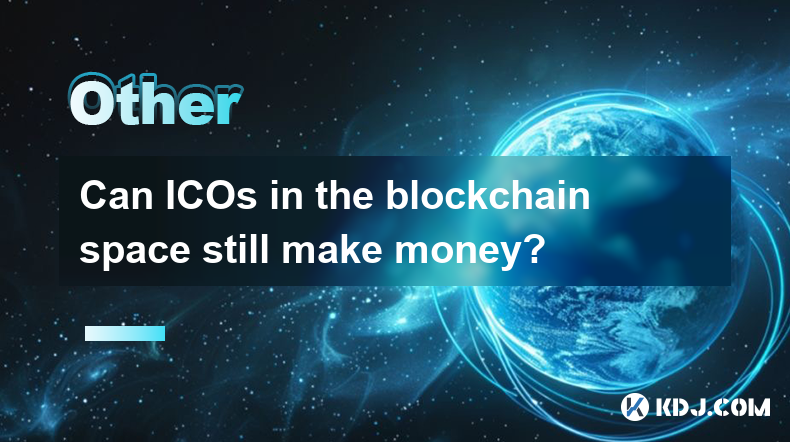
Can ICOs in the blockchain space still make money?
Apr 17,2025 at 08:29pm
The landscape of Initial Coin Offerings (ICOs) in the blockchain space has evolved significantly since their peak in 2017 and 2018. Despite the increased regulatory scrutiny and the rise of alternative fundraising methods like Security Token Offerings (STOs) and Initial Exchange Offerings (IEOs), ICOs can still be a viable way to raise funds and generat...
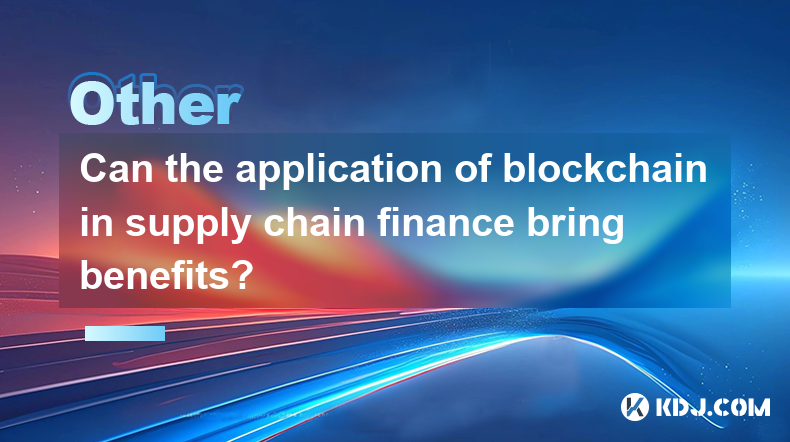
Can the application of blockchain in supply chain finance bring benefits?
Apr 15,2025 at 04:00pm
Can the application of blockchain in supply chain finance bring benefits? The integration of blockchain technology into supply chain finance has garnered significant attention in the cryptocurrency and financial sectors. This article explores how blockchain can potentially revolutionize supply chain finance, detailing its benefits and providing a compre...

Does the ranking of Chinese blockchain apps include cross-chain applications?
Apr 14,2025 at 04:00pm
The ranking of Chinese blockchain apps is a comprehensive evaluation that takes into account various aspects such as user base, transaction volume, and technological innovation. A pertinent question arises regarding whether these rankings include cross-chain applications. Cross-chain applications, which allow different blockchain networks to interact an...
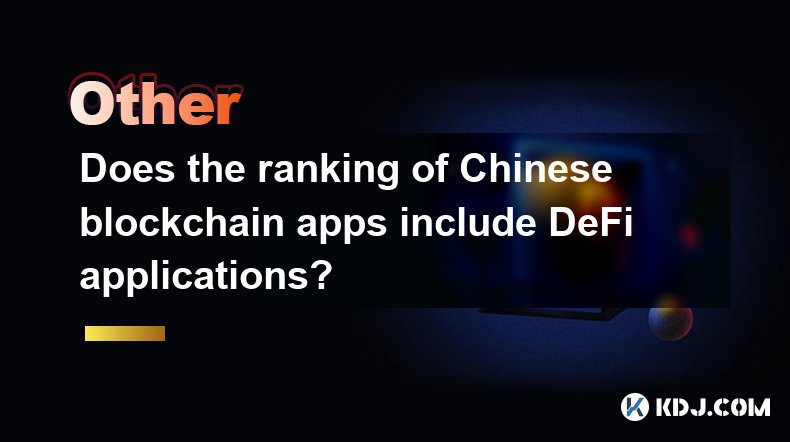
Does the ranking of Chinese blockchain apps include DeFi applications?
Apr 15,2025 at 06:57am
The ranking of Chinese blockchain apps is a comprehensive list that showcases the most popular and influential applications within the cryptocurrency ecosystem. One question that often arises is whether these rankings include DeFi applications. To answer this, we need to delve into the specifics of how these rankings are compiled and what types of appli...
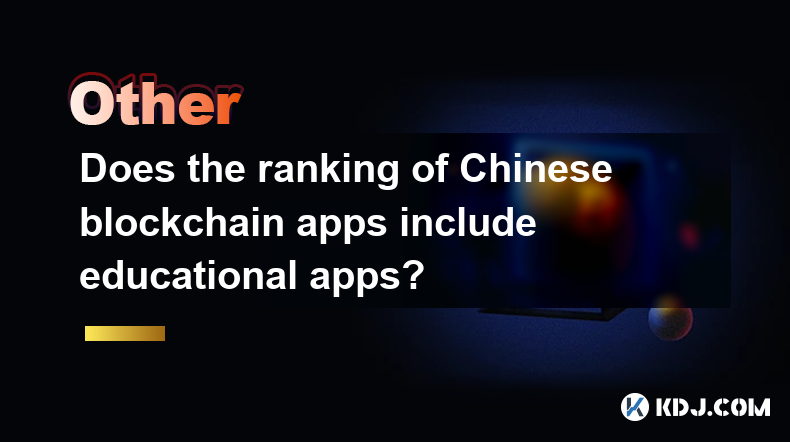
Does the ranking of Chinese blockchain apps include educational apps?
Apr 16,2025 at 03:35am
The ranking of Chinese blockchain apps often includes a variety of categories, from finance and gaming to social networking and beyond. One question that frequently arises is whether these rankings include educational apps. To address this, we need to delve into the specifics of how blockchain apps are categorized and ranked in China, and whether educat...
Does the ranking of Chinese blockchain apps include enterprise-level applications?
Apr 15,2025 at 06:42am
The ranking of Chinese blockchain apps often includes a variety of applications, ranging from consumer-focused to enterprise-level solutions. Understanding the scope and criteria for these rankings is essential to determine if enterprise-level applications are included. This article delves into the specifics of how Chinese blockchain app rankings are co...

Can ICOs in the blockchain space still make money?
Apr 17,2025 at 08:29pm
The landscape of Initial Coin Offerings (ICOs) in the blockchain space has evolved significantly since their peak in 2017 and 2018. Despite the increased regulatory scrutiny and the rise of alternative fundraising methods like Security Token Offerings (STOs) and Initial Exchange Offerings (IEOs), ICOs can still be a viable way to raise funds and generat...

Can the application of blockchain in supply chain finance bring benefits?
Apr 15,2025 at 04:00pm
Can the application of blockchain in supply chain finance bring benefits? The integration of blockchain technology into supply chain finance has garnered significant attention in the cryptocurrency and financial sectors. This article explores how blockchain can potentially revolutionize supply chain finance, detailing its benefits and providing a compre...

Does the ranking of Chinese blockchain apps include cross-chain applications?
Apr 14,2025 at 04:00pm
The ranking of Chinese blockchain apps is a comprehensive evaluation that takes into account various aspects such as user base, transaction volume, and technological innovation. A pertinent question arises regarding whether these rankings include cross-chain applications. Cross-chain applications, which allow different blockchain networks to interact an...

Does the ranking of Chinese blockchain apps include DeFi applications?
Apr 15,2025 at 06:57am
The ranking of Chinese blockchain apps is a comprehensive list that showcases the most popular and influential applications within the cryptocurrency ecosystem. One question that often arises is whether these rankings include DeFi applications. To answer this, we need to delve into the specifics of how these rankings are compiled and what types of appli...

Does the ranking of Chinese blockchain apps include educational apps?
Apr 16,2025 at 03:35am
The ranking of Chinese blockchain apps often includes a variety of categories, from finance and gaming to social networking and beyond. One question that frequently arises is whether these rankings include educational apps. To address this, we need to delve into the specifics of how blockchain apps are categorized and ranked in China, and whether educat...

Does the ranking of Chinese blockchain apps include enterprise-level applications?
Apr 15,2025 at 06:42am
The ranking of Chinese blockchain apps often includes a variety of applications, ranging from consumer-focused to enterprise-level solutions. Understanding the scope and criteria for these rankings is essential to determine if enterprise-level applications are included. This article delves into the specifics of how Chinese blockchain app rankings are co...
See all articles




















































































